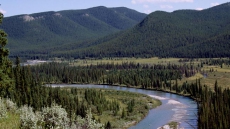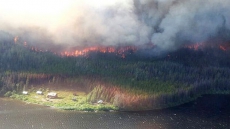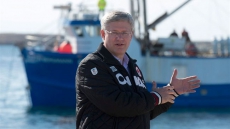EDMONTON - Six aboriginal groups near Alberta's oilsands are wondering where they can voice their concerns about growing development after the government said they shouldn't be heard at a precedent-setting review of the province's environmental plans for the area.
Alberta has told a panel conducting a review of the Lower Athabasca Regional Plan that the bands aren't directly harmed by it. The government also says the panel can't hear concerns about treaty rights.
"The majority of concerns raised by the applicant are not related to the content of (the plan) and are therefore outside the panel's jurisdiction and so must not be considered," say government arguments presented to the panel.
The bands say similar arguments have been used to shut them out of public hearings on individual energy projects held by both the provincial government and its industry regulator.
They wonder just where they're supposed to turn.
"When the nation raises cumulative impacts on treaty rights in relation to individual projects, it is told that LARP is the appropriate place to have these concerns addressed," said Melissa Daniels, lawyer for the Athabasca Chipewyan First Nation. "Now Alberta is arguing that it is inappropriate to raise these concerns with the panel specifically designed to review LARP.
"If this isn't in bad faith, I don't know what is."
Announced in 2012, the LARP was the government's third try at balancing environmental protection and economic development in a region increasingly key to the entire Canadian economy. Aboriginal groups immediately denounced it and promised to use a review process provided in Alberta's Land Stewardship Act to try to get it revamped.
But in documents submitted to the review panel, the government says the aboriginal complaints are beyond the panel's powers. It adds that none of those groups, whose reserves are all in the area, is "directly and adversely" affected by the plan.
The three-member panel is now reviewing hundreds of pages of documents from the bands and the province. It's the first time this type of panel has been convened.
The Athabasca Chipewyan, Fort McKay, Onion Lake, Cold Lake Cree, Mikisew Cree, Chipewyan Prairie Dene and Fort McKay Metis all maintain that their input was either not sought or ignored. They say the plan lacks benchmarks to measure impacts on traditional uses, prioritizes energy development over everything and puts aboriginal land use on the same level as snowmobilers and campers.
Alberta argues aboriginals will be consulted on frameworks within the plan dealing specifically with everything from biodiversity to air and water quality. But two years after LARP was introduced, few of those frameworks have been developed and one environmental group estimates that only 30 per cent of the plan actually exists.
"The area in which resource development can occur has been designated and the implementation strategies are in place, but the majority of the frameworks and regulatory tools to meet the (environmental) vision and outcomes have not been created," says the Fort McKay band's submission.
The aboriginal groups want more input on the overall direction of the plan.
"By restricting the scope of First Nations involvement to discrete lower-level decisions, the LARP fundamentally misunderstands what is required to meaningfully involve First Nations people in land planning," says Onion Lake.
They may have a point, said Nigel Bankes, chairman of the natural resources law at the University of Calgary.
"It's clearly very difficult for First Nations to find a forum capable of hearing and adjudicating their concerns," he said.
The review panel is composed of three provincial appointees and can only make recommendations to the minister. Those recommendations, however, may be subject to judicial review.
The panel has until June 22, 2015, to file its recommendations and it is also supposed to be made public.
Bankes said the provincial Tories are increasingly leaving First Nations only two options to voice their concerns — the courts or the streets.
"They are being pushed into the courts, or to take alternative actions as in roadblocks," he said.
"If you prevent people from making their arguments within the fora that seem to be set up for doing so, they can go in one of two directions — the very expensive courts or they can say, 'You don't have our consent to be in our traditional territory.'"





